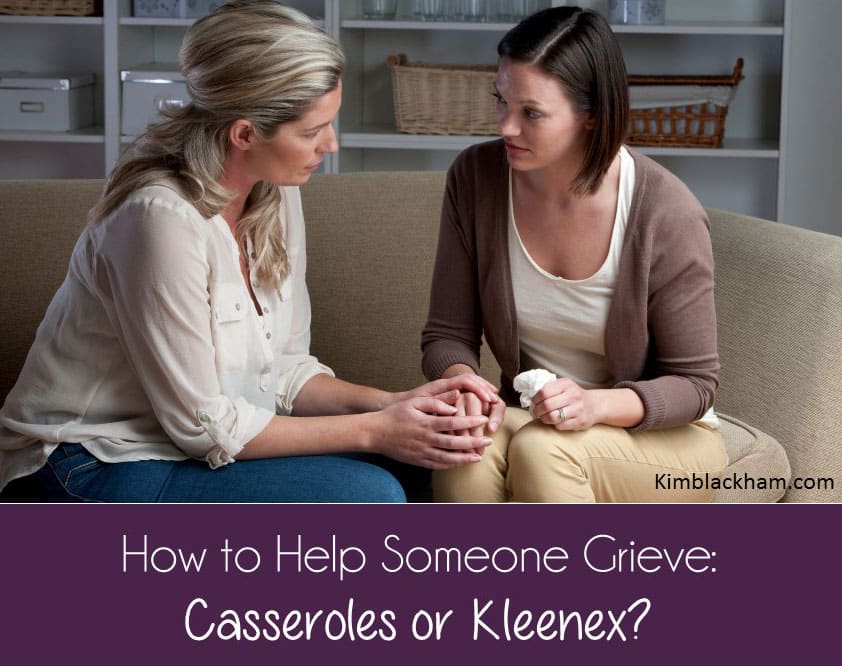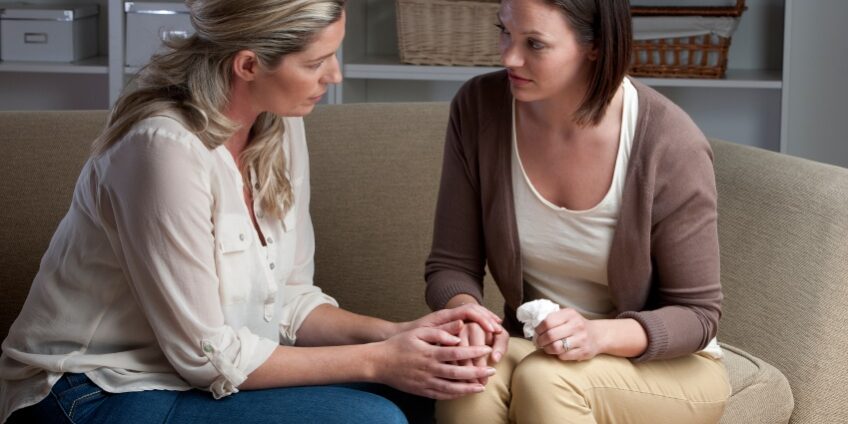
Three years ago last month some of our dear friends, Andrea and Tyler Gasser, lost their four month old little boy, Beckett. She went upstairs to her bedroom to wake him up from a nap only to find him unconscious. Days in the pediatric ICU did not revive him.
I remember when I received the phone call telling me that they had asked someone to bring them a pair of jammies and a blanket from home so they could wrap him up and hold him one last time before they removed life support and said good-bye. I wept for their family. My heart still hurts for them. At the time, I had a 4 week old baby boy and I grieved along with her as I could so easily imagine myself in her situation.
When these kinds of tragedies or difficulties happen, most of us do not know what to do or what to say. We don’t know how to help someone grieve. We know that our expressions of, “I’m so sorry for your loss” feel trite and even awkward, yet we care deeply and want to help. Most of the time, we just don’t know how.
I recently asked Andrea if she would share with me some of her thoughts on the things other people did during that time that were helpful and what others could have done that would have been more helpful. If you have not ever been in the situation of watching a friend suffer and feel at a loss of what to do to help, I encourage you to read anyway. I’m certain the time will come when you will find her words valuable.
Follow Up on Expressions of Love and Offers to Help
In the beginning week or two, lots of notes and blanket offers of help came in – to an overwhelming extent. Not that it wasn’t appreciated, but that first month I almost felt like I was watching my life from behind a glass–nothing felt real, things we were deciding seemed abstract, and I was so numb and shocked that my mind didn’t feel like it was functioning–so many of those notes and offers slipped into that blur. But later, it felt like once the offer was made, that person had checked it off of their to-do list and after only a few weeks no mail and very few offers of help came in. Even a month later I wasn’t at a functioning level that I could go back through letters and call someone up and ask them to help. It feels like all of those gestures of kindness were almost wasted.
Regularly Let Them Know You Remember and Care
 I really could have used some “thinking of you” cards on a monthly basis throughout the year rather than all at once. One of the hardest things is feeling like you have been checked off of everyone’s check list and everyone around you has moved on, leaving you in the dust. Grief is a painful and very lonely road. – One of the very best things that happened for me was a daughter of my mom’s friend, whom I had never met, sent me monthly packages. They were simple, but they were full of love and support and were a reminder that I wasn’t forgotten – which was definitely what I needed more than anything. She sent flowers, homemade Christmas ornaments, favorite books and movies, she even had pizza delivered to our house one of the months. The main thing was that it was reliable, which was a big deal.
I really could have used some “thinking of you” cards on a monthly basis throughout the year rather than all at once. One of the hardest things is feeling like you have been checked off of everyone’s check list and everyone around you has moved on, leaving you in the dust. Grief is a painful and very lonely road. – One of the very best things that happened for me was a daughter of my mom’s friend, whom I had never met, sent me monthly packages. They were simple, but they were full of love and support and were a reminder that I wasn’t forgotten – which was definitely what I needed more than anything. She sent flowers, homemade Christmas ornaments, favorite books and movies, she even had pizza delivered to our house one of the months. The main thing was that it was reliable, which was a big deal.
Don’t wait for them to ask for help. Offer to help and then just do it.
Another issue is that many offers were “Call me if you need anything, I’m here and ready to help at any time.” And I never called, not because I didn’t need help, but because identifying a need, figuring out who might fill that need, and then making a phone call to ask for their help was beyond my energy levels and ability. It would have helped if people offered exact help, and then followed through on their own. Not only did I need lots of help, but people stopping by on their own because they’re helping (and not just to say sorry, or offer advice on how to deal with the grief or how their mom dealt with the same grief, etc.) would have been good for my loneliness and tendency to withdraw completely. It would have been good to have more human contact – to know I wasn’t forgotten and I was loved, even if it just meant stopping by with a gallon of milk once a week or once a month at a certain time or calling to say you’ll be there every other Tuesday at 11 am to help clean bathrooms, etc. Offering specific help at a designated time and then following through would have been really helpful.
 One example of this was someone bought all of my kids’ school supplies. They just texted or called and asked the grades and if there were any extra teacher requests beyond the normal school list and then brought it to me in bags ready to go. Another friend offered to change the look of my bedroom and gave me very specific decisions to make, but then just followed through and did the rest on her own. This was incredibly helpful. I’m grateful she asked first (some obvious jobs might not be helpful to just do without asking in case it’s not being done because it’s the last “smell” memory, etc.) but then she took charge once given the go ahead. I don’t know that I would have been capable of going back to that room as it had been. My house in general was hard enough to live in and to try to get over the trauma that occurred there.
One example of this was someone bought all of my kids’ school supplies. They just texted or called and asked the grades and if there were any extra teacher requests beyond the normal school list and then brought it to me in bags ready to go. Another friend offered to change the look of my bedroom and gave me very specific decisions to make, but then just followed through and did the rest on her own. This was incredibly helpful. I’m grateful she asked first (some obvious jobs might not be helpful to just do without asking in case it’s not being done because it’s the last “smell” memory, etc.) but then she took charge once given the go ahead. I don’t know that I would have been capable of going back to that room as it had been. My house in general was hard enough to live in and to try to get over the trauma that occurred there.
My husband was in residency at the time of Beckett’s passing. The financial burden of a funeral and his hospital expenses was completely overwhelming. Our fellow church members generously contributed to those expenses, including the plane tickets for us to fly home and bury him close to our parents. There were also individuals who stepped forward anonymously and paid all of our medical bills. I can’t even begin to mention how grateful we are for the help and comfort that gave us at the time.
These are just a few examples of kindness and help that others gave. Just stepping up and offering specific help is huge.
Allow them to talk about their grief and realize saying something is generally better than not saying anything at all.
When I was out in public I felt like I was being avoided, so I felt alone even in group settings. I understand the feeling of not knowing what to say or how to say it, but just being close and supportive and loving would go a long way. Usually things said in a loving way – even if they weren’t said in the best way, was better than being avoided. Often when I would say something about Beckett or how things were going in my life, I was looked at with horror (probably because they were afraid and unsure of how to respond), this made me pull away even more though because feeling like they didn’t want to hear about my little boy hurt worse than feeling alone and avoided
Realize that a game face is usually that – a mask. Just because they look okay on the outside doesn’t mean they are okay on the inside.

Often I was and am told that I “seem” put together, that I must be incredibly strong and like I’m doing great. I know it’s probably meant as a compliment, but it feels like I’m being labeled that way more for their sake: to justify why they haven’t tried to help or talk to me about how I really do feel. I do try to “seem” put together for those few hours out and about that I’ve prepared my game face for in order to survive – just like everyone does. If I started to sob or fall apart at church every week while I’m dragging four kids in and out by myself, I couldn’t function anymore and I can’t ALWAYS cry when I feel sad or my poor kids would have a rough life. I let them see it occasionally, especially when there’s an obvious reason why I would have remembered Beckett at that moment just so they know I still mourn and miss him and remember the day he died and that it’s ok for them to feel bad and cry too sometimes. But I don’t want them to ever feel like they aren’t good enough and only Beckett can make me happy, so I typically wait for nap times or moments locked behind the bathroom door to let it out and then try to press on when I’m being the mom. I think that’s what all moms/people do isn’t it?
Include them in your day to day life. Keep inviting – even if they turn you down. Encourage them to talk about their experience.

I was able to spend about one day a week just being at a friend’s house, spending time feeling like a normal friend, being allowed to be a part of her daily life, letting our kids play and most importantly conversing. She listened and talked to me like I was a normal person. She didn’t shy away from listening to me talk about my grief, seeing me cry and listening to things that triggered my panic/fear. Others would try and shy away from those topics and act very uncomfortable if I brought them up, but this friend encouraged me to talk about those things. She empathized and offered love. I never felt judged or like I was being told to “get it out” and then move on. She genuinely wanted to know what I was feeling and dealing with. Sometimes I’m sure she heard the same details over and over again, but it helped for me to say things out loud to even know if my thoughts made sense to myself. She created moments where it felt natural to converse. Like making freezer meals (giving me recipes and lists of groceries to buy was incredibly helpful so I didn’t have to think too much about it) at her house. It was something that was really helpful for me to have on hand and it was even more helpful to do it with a friend while talking rather than alone in silence. More planned events like this with other friends would have been helpful. It’s in the quiet of my home that the most desperate feelings of grief and guilt and pain would weigh me down and consume me in the most painful and uncontrollable way.
Realize that grief is a really, really long process. Realize it will always be a part of who they are.

It has felt like our fast paced culture doesn’t have time to help someone with the LONG process of grief. I often feel like I am looked down on for STILL being sad, or bringing up my grief or even just talking about Beckett in normal conversation. Even after only a few months I felt that way. I think maybe that’s why they used to wear black for a year or more after a loved one died. That way even if their face and actions seemed put together, at least other people would be aware that they still were hurting and struggling with the loss even though it’s been a long time. It really helps to be around people who don’t cringe when Beckett’s name or my loss is brought up and who aren’t trying to obviously avoid the subject. It feels better to be around people who bring him or what I struggle with up in random conversation and recognize that my grief is a part of who I am, that it’s not a separate “thing” that goes or should have already gone away.
Remember important dates.

Remember birthdays and death dates, holidays and anniversaries. Remember the day they were diagnosed or experienced a trauma. While those days will be just another day to the rest of us, they are significant and emotion filled for those grieving. You reaching out and letting them know you remember too will mean a lot. Andrea recalls that “Women from church sent me a care package on Beckett’s first birthday, and other friends had a ‘birthday lunch’ that day for me. Someone else dropped off a shake, while others called. That was a hard day and it meant a lot to me that they remembered.”
Andrea concludes, “We really are so grateful for everyone who did express love, kindness, and support during this painful time. We can’t possibly list all of the small and large acts of kindness that helped us survive that time. We recognize it is hard to know what someone else needs when they are grieving. Without this experience, I don’t know that I would have known how to help someone else either. I offer these suggestions only as a way to provide some ideas when you want to help, but just don’t know how.”
Suggestions on How to Help Children Grieve






